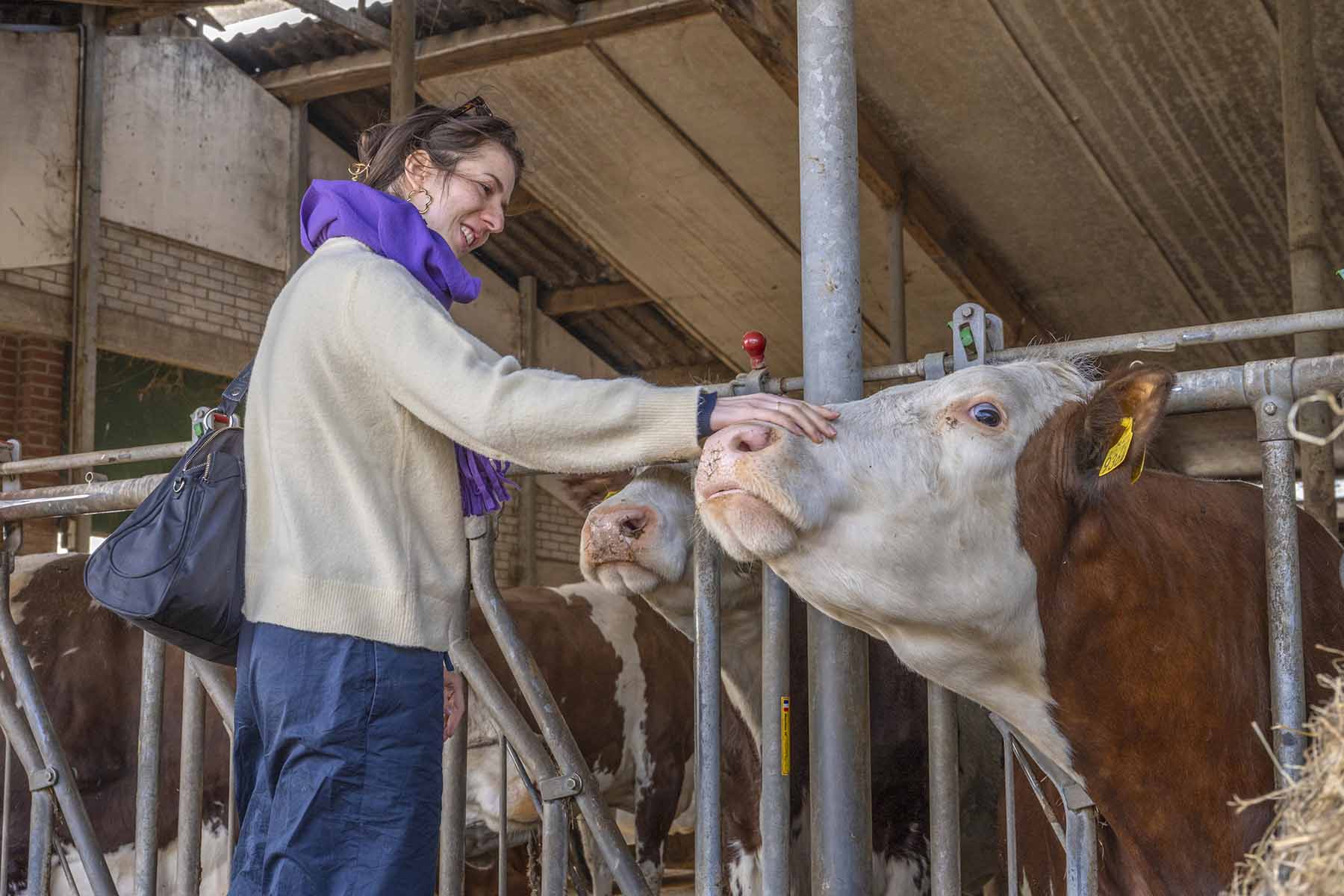
Field trip to sustainable farm shows ‘what you can achieve if you chart your own path’
How to take ownership of your career? To find out, students from ‘Design Your Career as a Climate Change Maker’ visited a farmer who has done just that. They learned from him that it’s never too late to start working on something you believe in.
A line of yellow bikes, in pairs, make their way from Leiden to Warmond. After half an hour of biking, and even taking a ferry, they finally reach their destination: Farmhouse Solitude. Present at today’s trip are about 20 students from Leiden University. Two representatives of the Ministry of Agriculture, Fisheries, Food Security & Nature also joined. They wish to see the regenerative farm’s innovative production methods.
The students, active in various bachelor’s and master’s programmes at Leiden University, are participants of the course Design Your Climate Career of the Honours Academy. Participants discover how to prototype a career in relation to the climate crisis. Additionally, they learn to get in touch with real-life changemakers.

About this course
Many students don't know what they want to do after graduation, but do know they want to work on the climate crisis.
Designing Your Career as a Climate Change Maker (5 EC) is an extracurricular skills course from the Honours Academy that helps students chart their path. It combines elements of self-discovery with knowledge about societal transitions, to enable students to determine their role in these challenging times.
Students learn about their strengths, how to deal with eco-anxiety, and articulate a vision for a liveable planet. They visualise three possible lives and adopt a prototyping mindset in exploring these. For instance, students talk with people who already work in positions interesting to them. Read more about Designing Your Life.
From Amsterdam to Warmond
Today, the students meet a real-life example of such a changemaker: farmer Joost van Schie. Joost had never thought he would, one day, run the family farm. The 50 hectares of land had been in the family for five generations, but Joost had other plans. He studied economics in Amsterdam and built a successful career in business innovation.
Until, one day, he had a conversation with his parents about the future of the farm. It got him thinking: 'Should I go back?' And so he did, showing the students that it’s never too late to change career paths. 'Ever since I made the step, I haven’t looked back. And I have no regrets.' The fulfillment he gets from working with his family on something he believes in, with room for personal creativity, could not be matched by a corporate job.
Farming with care for biodiversity
The combination of peat-clay soil and land-use regulation make milk production the only viable agricultural use of the land, Joost says. Yet he and his family do things differently than many other farmers. 'Most of the magic you can’t see', Joost quips as he tells about how they work on improving the soil and biodiversity.
For example, Joost limits the grazing of his 50 cows to small strips at a time, so the soil can absorb manure, water and CO2 better, and grass and herbs have more opportunities to grow. Part of the farmland is also a refuge for endangered meadow birds, and Joost experiments with growing indigenous herbs to make tea.

Most of his business, however, revolves around cheese production. In fact, Joost is a real cheese-afficionado. 'I hope to build a brand of cheese varieties. Our flagship product Wilde Weide Kaas (Wild Meadow Cheese) is available in the Netherlands, the UK, Germany and the US and we are currently experimenting with a new type of cheese.'
On top of running the farm, Joost has started a chain of stores called OOGST. The stores sell organic agricultural products from local farmers to consumers in Leiden, Woerden and Haarlem.
Inspiring students
All in all, it’s been an inspiring day for the students. Seeing the farm, patting the cows and learning about organic farming helped them reconnect with nature. But it also made them realise how much work there’s left to do to create a sustainable society. 'It made me think of how much of a say we can have with what we eat', says Lea.
'The goal is that students take ownership of their future'
Perhaps more importantly, the students got a concrete example of how to craft a climate career, making their own journeys seem more feasible. Student Ye: 'Seeing Joost come up with his own idea, and execute it, gave me a new perspective.' The students bike home again with renewed energy to start their own projects, act towards change, and materialize hope for a sustainable future.
The coordinator of the course, Bram Hoonhout, leaves the island inspired as well. 'The main goal of this course is that students take ownership of their future, and use their talents to work on their ideals for a better world. Joost’s story clearly demonstrates what you can achieve if you chart your own path.'

Photos: Buro JP
Text: Nicolás Moreno Gutiérrez, David Wachenfeld & Bram Hoonhout
Final editing: Michiel Knoester
